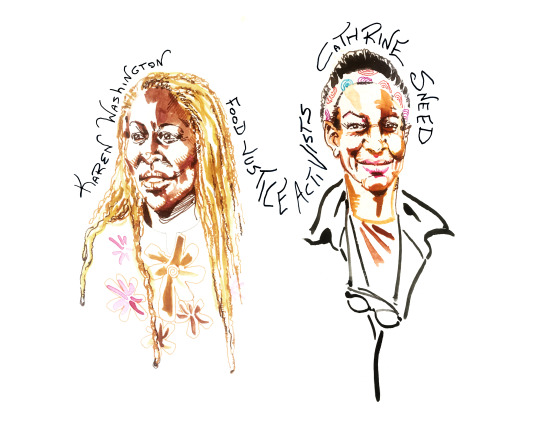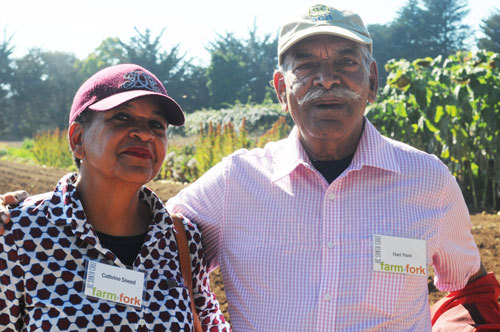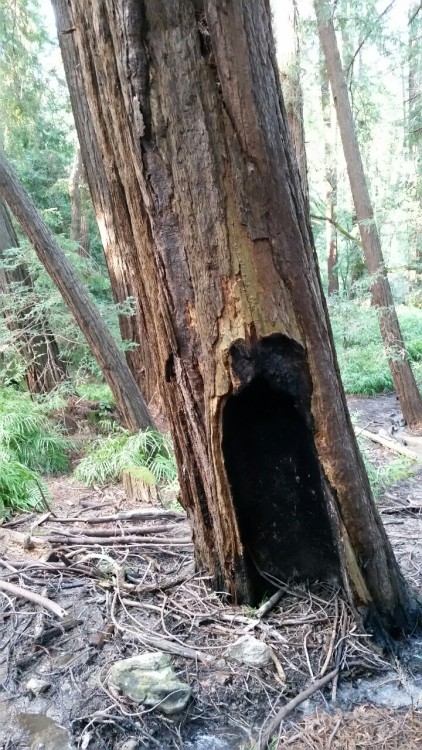#uc santa cruz

Credit:George McCalman
“Food should be a right for all and not a privilege for some.”
— Karen Washington
Fresh food should not be out of reach due to racism.
As a physical therapist, lifelong NYC resident Karen Washington is more in tune with the needs of the body than most. In the early years of her practice, she noticed some of her clients were struggling with what she calls the “three food groups — fast, junk and processed.”
Washington spotted a vacant lot across the street from her Bronx home, where she’d already planted a backyard garden. She transformed the lot into the Garden of Happiness in 1988 and her journey into community gardening began.
All around the Bronx, Washington and her neighbors found throwaway spaces and turned them into gardens, eventually founding a farmer’s market. When Mayor Giuliani tried to wipe away their work in the ‘90s, Washington and other activists resisted, drawing on civil disobedience tactics — and they succeeded.

On the left, Karen Washington receives a 2010 National Medal for Museum and Library Service along with Gregory Long, director of the New York Botanical Garden, from First Lady Michelle Obama at the White House. Pictured to the right, Washington with her tools.
Their work laid a template for a broader urban ag movement, but for Washington community gardening is first and foremost about social justice. To continue her journey in urban farming, Washington attended UC Santa Cruz’s Center for Agroecology and Sustainable Food Systems (CASFS) apprenticeship program in 2008. The “mothership of organic agricultural training,” in the words of executive director David Press, CASFS teaches cutting-edge techniques for healthy, sustainable food, and the education, in the words of Washington, was a “gift.”
Returning to New York, Washington not only co-founded Black Urban Growers, a volunteer-driven support network, but sought to replicate her experience at UC Santa Cruz.
“We found a lot of people couldn’t get to California, so we replicated a sort of CASFS program in NYC,” Washington said. Her Farm School NYC focuses on community-based activism and farming to encourage residents of low-income neighborhoods to embrace food sovereignty and disrupt a food system that does not serve them well — if at all.
While black households disproportionately struggle from food insecurity (1 in 4 experience food insecurity, compared to 1 in 7 overall and 1 in 10 white households) for those recently released from prison, food insecurity is nearly a guarantee — 90 percent report experiencing it. The need to feed your family can drive people to desperate measures, as Cathrine Sneed of the Garden Project knows well.
“In my 20-year history, I have spoken to too many young men who said ‘I started selling drugs because my momma couldn’t feed me, and I was hungry.‘”
— Cathrine Sneed
“In my 20-year history, I have spoken to too many young men who said ‘I started selling drugs because my momma couldn’t feed me, and I was hungry,'” Sneed says of her work in urban gardening. A fresh young law school graduate, Sneed landed in San Francisco County Jail as a counselor, focused on helping prisoners live successful lives once released outside. But she found it wasn’t so easy to break the cycle of recidivism — they walk into the world with no money, no job, no home, and no food.
Sneed couldn’t fix all these issues — but she could lead prisoners outside, onto the jail grounds, to work on land that had once been a farm. Her wish was that they could derive hope from a connection with the land and by providing food for the community. Her results surpassed her wildest dreams.

Cathrine Sneed, left, keynote speaker for the 2014 Farm to Fork event at the UC Santa Cruz at the Center for Sustainable Agriculture and Food Systems (CASFS). Photo by Melissa De Witte.
In 1992, Sneed, another former UC Santa Cruz CASFS apprentice, began the Garden Project to meet the demand of former inmates connected to the work. The scope of the project expanded to include counseling, continuing education assistance and job training. The Garden Project has planted over 10,000 trees in San Francisco — and has cut the recidivism rate, nationally at 50 percent after two years on the outside, to 25 percent for its participants.
Sneed has now extended the program to at-risk adults and high school students, to break the cycle before it starts. “Gardening is the recipe for success,” said Sneed of the work. “This is how we stop crime.” Thanks to these two women, urban gardening is also a recipe for community empowerment, and longer, healthier lives.
Samuel L. Jackson, John Travolta, Harvey Keitel and Quentin Tarantino on the set of Pulp Fiction, 1993.
Post link









